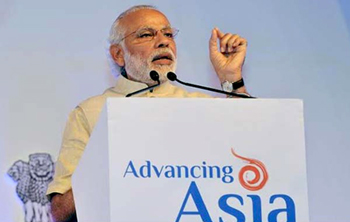New Delhi, Mar 12: The government will continue to push for reforms, Prime Minister Narendra Modi asserted on Saturday. "My agenda for reform to transform is yet to be finished," Mr Modi said the 'Advancing Asia' conference in New Delhi.

Speaking on the second day of the conference, Mr Modi said, "India has shown that a large and diverse country can be managed in a way that can promote economic growth and maintain social stability. One way in which we are doing this is through cooperative and competitive federalism."
"Amid global problems, I am happy to say that India is a haven of macro-economic stability and a beacon of hope, dynamism and opportunity," Mr Modi said.
Listing out his government's reforms agenda from opening nearly all sectors to foreign investment to improving ease of doing business, Mr Modi said the government now intends to focus on the rural sector. "We have increased investment in the rural and agriculture sector, because that is where a majority of India still lives. But our help to the farmers is not based on giving hand-outs," he said.
He also announced a new centre to be set up in India here for capacity building on fiscal and monetary policy space for six countries in the region: Bangladesh, Bhutan, Maldives, Nepal, Sri Lanka and India. "The centre will provide training to government and public sector employees. It will enhance their skills and improve the quality of their policy inputs. It will also provide technical assistance to governments and public institutions," Mr Modi said.
IMF Managing Director Christine Lagarde, who was also a keynote speaker at the conference, had earlier said that "with the promise of more reforms, India's stars are shining bright."





Comments
Yes you are busy with global tour.
Your MPs, other leaders are busy in intolerance speech, hatred talk,
So you did not finish your reform, surprisingly you have no time even to start, nor time to think.
This is a nataka company, not government. At least allow other parties to rule and develop the country.
Is it Your agenda or cheddi agenda. We are not confused, we are sure it is cheddi agenda of destruction of indian unity..
Add new comment